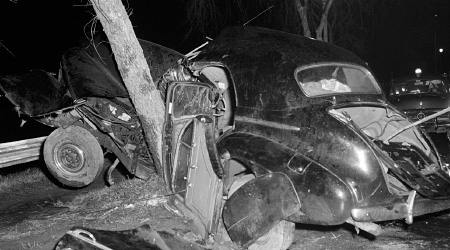What Happens If Someone Is In An Accident Which Is Their Fault?

All states have a minimum requirement of liability insurance coverage or similar amount in bond to operate a motor vehicle. While full coverage with comprehensive and collision protection is great for repairing damage to a vehicle it is not always necessary for every automobile. In those situations where a vehicle has a low blue book value or has already sustained damage liability coverage protects other drivers in the event of an accident. Liability coverage is specifically required for at fault accidents where one party has injured or damaged another parties person or property.
If a driver chooses to have full coverage including comprehensive and collision then there's still the question of how much is the deductible. If the other driver makes a claim for personal or property damage that will be paid for by your insurance company up to the maximum amount of coverage purchased. If however you are at fault then you will be unable to make a claim against the other persons auto insurance. More correctly, if you try to make a claim and a police report, witnesses and evidence point to it being your fault, your claim will be denied. In this situation any repairs made to your vehicle from damage sustained in the accident will be paid after the deductible is met which can often be up to $1,000. Keep this in mind because depending on the damage, it may be more appropriate to pay for repairs out-of-pocket instead of filing a claim with your insurance company. The resulting increase in your auto insurance premiums may be more than the benefit received from filing a claim.
Insurance payouts from claims filed aren't the only repercussions if someone is in an accident which is their fault. An individual's driving record can accrue black marks or demerits which are represented as points. Once these points reach a certain level, usually 8 to 9, a person's drivers license can be suspended or revoked for period of time. The more moving violations such as speeding and driving dangerously, including accidents, the more points and an increased possibility of losing your license. In some states, points can stay on a driving record for a year but it is also possible for them to remain in place for up to three years. Poor driving often directly results in higher auto insurance premiums which can lead to hundreds or thousands of dollars in increased costs. This is especially true if there are multiple accidents within a short period of time. It is even possible with enough accident claims filed against your insurance that it can become impossible to purchase insurance at all. In states with mandatory auto insurance requirements, no insurance means no registration which means no vehicle to drive.
Sometimes individuals who have already been in an accident or have accrued significant points have an incentive to try and settle a minor fender bender off the record. What this means is that both parties agree to not file a police report or contact their respective insurance companies. This however is a very bad idea. By not having authorities and insurance companies involved it can easily devolve into a nightmare scenario of hearsay and accusations leading to lawsuits and medical claims. It is always best to involve professionals even when it may result in increased premium prices or a suspended license. The last thing anyone wants is to be blackmailed for thousands of dollars due to a fender bender that wasn't properly documented.
When someone is an accident which is their fault it is understandable that they would want to resolve the situation as quickly and painlessly as possible. Unfortunately there are no shortcuts to justice. While there may be repercussions such as a suspended license or higher insurance premiums these are more favorable outcomes than lawsuits and blackmail. Always call the police if possible and always call your insurance company to report an accident whether you are at fault or not.







